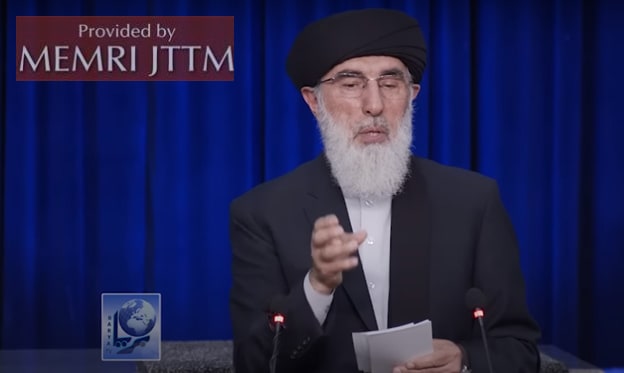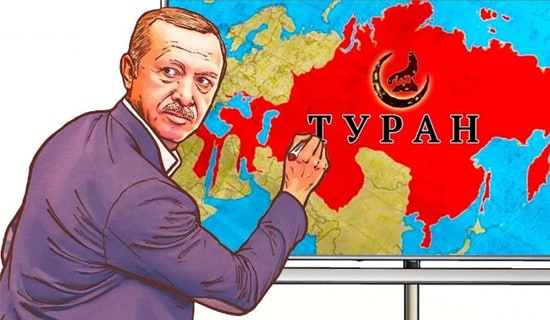During a recent weekly Friday sermon at a mosque in Kabul, former mujahideen leader and head of Hizb-i-Islami Afghanistan (HIA) Gulbuddin Hekmatyar said that the Doha agreement signed between the U.S. and the Afghan Taliban has failed to bring peace to Afghanistan. Hekmatyar, who joined the peace process with the previous government, told the worshippers that an intra-Afghan negotiation should be held to look for a way forward.

In the sermon, Hekmatyar urged all of the sides not to repeat the past experiences and instead bring an end to the war because, he said, war and ongoing instability are not in anyone's interests. He articulated a five-point plan as detailed below.
Unconditional Intra-Afghan Negotiations
"We, the Hezb-i-Islami, present this plan to all.
"1. Unconditional talks between all the affected Afghan sides and every decision of this meeting should be unanimous and not on the basis of minority or majority, but rather by consensus. The decision of this meeting should be acceptable to all. No one should set pre-conditions… This meeting should be completely intra-Afghan, without active foreign presence.
"The major fault of the past negotiations [in Bonn, or in Doha between the Taliban and the U.S.] was that it was not intra-Afghan. The presence of foreigners was very strong and active in those [talks]. The Doha talks did not succeed because it was between the two sides and one of them was a foreigner and all the Afghans had not been included on the other side. [The talks] were between two specific parties that is why it did not have any result."
Three Stakeholders For Intra-Afghan Negotiations
"2. This meeting [for intra-Afghan negotiations] should be between the delegations of three sides: the [Taliban] government, the armed opponents [such as the National Resistance Front of Afghanistan and others], and those who are against the war and want peace. These three important parties should be represented in the talks by authoritative and powerful members. Regretfully, they had not been included in the previous talks. Those were the Bonn talks, the Moscow talks, the Doha talks, and talks held elsewhere. A comprehensive meeting that should have comprised of all the affected parties was not held.
"This time, all the affected parties present here, both the warring sides and those who do not want war and want peace, and those who oppose war and do not support any side in the war, should hold talks. These three sides should be part of the negotiations."
Foreign Countries As Observers
"3. It would be good if the involved foreign parties and UN's representatives take part in these talks as observers. But they would not be the real participants of these talks and will only be observers sitting back and playing the supporting role. They, however, will promise to avoid any interference in the internal affairs of Afghanistan and will support every agreement reached by the Afghans."
Talks In Impartial Country
"4. The meeting will be held in a country that has not been involved in the war [in Afghanistan] in the past 43 years nor has supported any Afghan party or provided them financial and military support. It should not have been the supporter of any Afghan side and should not have supported the foreign aggressors in the occupation of Afghanistan. It should not have provided military and financial support [in the occupation of Afghanistan]. It must be a completely impartial country and not one of the neighboring countries…."
Consensus Without Conditions
"5. The agenda of the talks should be formed with the consensus of all [the parties] in the first meeting [of the negotiations] without any restrictions and conditions. The agenda of the talks should be set in these talks [defining] what will be the real point of the discussion. The formation of a coalition government and power-sharing will not be the real issue of the discussion [at this stage]…."
Hekmatyar suggested that the first article of the agenda should be the establishment of an authoritative decision-making high council which will create national consensus, adding that the members of this council will represent the nation. He also said that the same council will establish a new Islamic constitution for Afghanistan and will make a final decision on the formation of the country's next government.
"The incumbent [Taliban] government, which is temporary and calls itself 'acting,' will transfer the power peacefully and without any delay to the next government formed under the new constitution," Hekmatyar said, adding that all of these steps including the talks, the establishment of a decision-making council, creation of an Islamic constitution, and forming the next government, should be done in a period of one year and that all the parties must promise that the power will be transferred peacefully and without any violence or coup d'états in the future.
The former mujahideen leader said that Afghans will give assurance to the world that Afghanistan will not shelter the armed opponents of any country and will not allow Afghanistan to be turned into a battlefield for a proxy war. "The relevant countries whose representatives will attend this meeting as observers will also give assurance that they will not support the armed opponents of Afghanistan after this – neither propaganda support, nor political, financial, and military support," Hekmatyar said.
Criticizing the Afghan Taliban government's decision of outlawing girls' education above sixth grade, Hekmatyar said that same as the boys, the girls also have the right to go to school. He added: "The boys too, like the girls, are facing moral threats. It will be very strange if someone considers the threat to a girl serious and are not sensitive to a threat to the young boys."
"There is no religious justification for why the boys should go to school and the girls are barred," Hekmatyar, who has served as prime minister in the past, said, adding: "If moral corruption is presented as a reason [for the ban on girls' education], then this corruption also poses a threat to boys equally or higher in some regions."
If the Taliban government has reservations over the curriculum used to be taught in schools and colleges in the previous government, then they should reform it instead of barring girls from going to schools, he said, adding: "Yes, we agree that the previous curriculum should be changed."
Source: YouTube.com, October 1, 2022.





